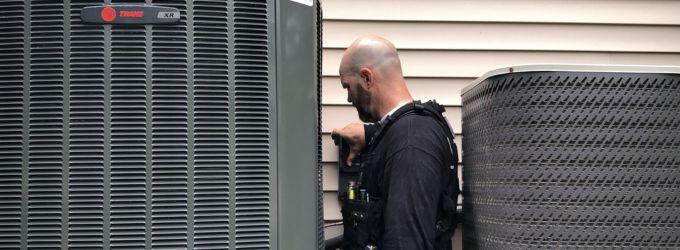When your heating or cooling system fails, it can feel like an emergency. But as HVAC professionals, we know there’s a crucial difference between an urgent repair and a genuine HVAC emergency. Understanding this distinction can not only save you money on after-hours service calls but, more importantly, can help you prioritize your family’s safety.
What Is an HVAC Emergency?
An HVAC emergency is a situation that poses an immediate risk to the health and safety of your home’s occupants or could cause significant, sudden damage to your property. It is a problem that requires immediate attention from a professional, regardless of the time of day.
The Difference Between an Emergency and a Repair
The key difference lies in the level of risk. A standard repair is an issue that, while inconvenient, doesn’t threaten your safety or make your home uninhabitable. An emergency, on the other hand, is a situation where waiting for regular business hours could be dangerous.
- Emergency: Your furnace is leaking natural gas or your heat pump is completely inoperable in sub-freezing temperatures. These are safety and habitability issues.
- Repair: Your furnace is making a strange noise or your AC is not cooling as well as it used to. These are problems that can often wait for a scheduled service call.
Clear Signs of an HVAC Emergency
When a system failure directly impacts safety or makes your home’s living conditions unbearable, it is an emergency.
Safety-Critical Emergencies
These are the most serious situations and require immediate action.
- Gas Leak: If you have a gas furnace and smell the distinct odor of rotten eggs, you may have a gas leak. This is the most dangerous HVAC emergency. Leave your home immediately and call your gas provider and emergency services from a safe location. Do not use light switches, cell phones, or anything that could create a spark.
- Carbon Monoxide (CO) Leak: A cracked heat exchanger in a gas furnace can leak this colorless, odorless gas. If your carbon monoxide detector sounds, or if you experience symptoms like dizziness, nausea, or headaches, evacuate your home immediately and call emergency services.
- Burning Smells: While a minor dusty smell is normal on the first use of the season, a strong, acrid, or burning plastic smell accompanied by visible smoke is a sign of an electrical fire or overheating component. Turn off all power to the system at the circuit breaker and call for emergency service.
When Your Home’s Livability is at Risk
These situations, while not an immediate safety risk, make your home unbearable during extreme weather conditions.
- No Heat in Extreme Cold: If your furnace or heat pump fails completely during a winter storm or freezing temperatures, it’s a cold-weather emergency. Pipes can freeze and burst, causing extensive water damage, and extreme cold can pose a health risk, especially for the elderly or young children.
- No Cooling in Extreme Heat: In regions where summer temperatures reach dangerous highs, a complete AC system failure can be a health emergency, especially if you have sensitive individuals in your home. Prolonged exposure to extreme heat can lead to heatstroke or other heat-related illnesses.
What to Do in an HVAC Emergency
Immediate Safety Steps
In any safety-critical emergency, the first steps are always the same:
- Turn off the power and/or gas to the system.
- Evacuate the home if you suspect a gas or carbon monoxide leak.
- Call emergency services (911 or your local emergency number) if a gas or CO leak is suspected.
- Contact a professional HVAC company for emergency service. Once the immediate danger is handled by emergency services, a professional HVAC technician is needed to diagnose and safely repair the root cause of the problem. A certified company like Meyer Heating & Air can dispatch a technician to your home to address the issue.
When to Call for Standard HVAC Repair
Not all issues require an emergency service call. Most problems, even if they’re a nuisance, can be scheduled during regular business hours, saving you money on after-hours fees.
Common Issues That Can Wait
- Strange Noises: While a grinding or banging noise is a sign of a problem, if the system is still functioning, it can often wait for a scheduled appointment.
- Reduced Performance: If your AC is blowing cool but not cold, or your furnace is not heating as fast as it used to, it’s a sign of a problem that needs attention soon, but not necessarily in the middle of the night.
- Minor Leaks: A small amount of water leaking from the indoor unit’s drain line is a problem that requires a service call, but typically not an emergency unless it’s causing extensive damage.
Need Emergency HVAC Service? Contact Meyer Heating & Air
When an HVAC problem poses a threat to your safety or comfort, don’t hesitate. Our certified technicians are available for emergency service to address your most critical heating and cooling issues quickly and safely. For all other HVAC needs, our team is ready to provide reliable, expert heating & cooling services during normal business hours. Your safety and comfort are our top priorities.

